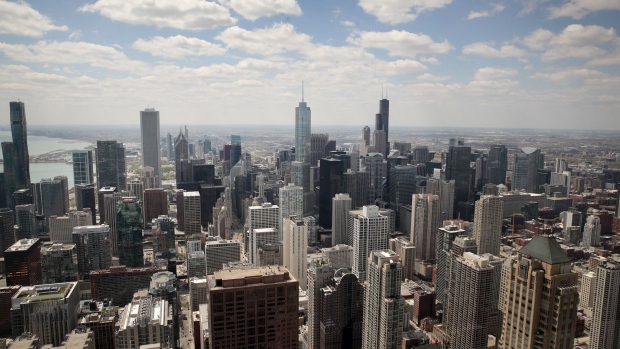Apr 15, 2024
Private Chicago Liberal Arts College Is on Brink of Junk Rating
, Bloomberg News

(Bloomberg) -- A private liberal arts and sciences college in downtown Chicago got its credit rating cut to the brink of junk as its operating deficits are expected to extend into the foreseeable future.
Columbia College Chicago was downgraded two notches to BBB-, the lowest investment grade designation, by S&P Global Ratings on Friday. The firm’s outlook on the school is negative as its challenges aren’t expected to abate until at least 2027. It’s the latest salvo to the increasing pressures facing US colleges and universities.
“This recent trend of weak financial performance has led to the rapid deterioration of Columbia’s financial resources and has materially weakened its liquidity,” S&P credit analyst Nicholas Fortin said in a statement.
Columbia College Chicago is already taking steps to stabilize finances including cutting operating expenses by $19 million for the fiscal year starting Sept. 1, Lambrini Lukidis, associate vice president, said in an emailed statement on Monday.
The college also is analyzing its programs “to better align curricular offerings with industry trends and market demand in creative fields to improve enrollment and retention,” Lukidis said. “The college continues to focus fundraising strategies and partnerships to increase development derived revenues and to offset reliance on tuition revenue.”
Small schools across the US are facing declines in enrollment as fewer students seek a degree while also contending with higher operating costs.
Read More: The Economics of Small US Colleges Are Faltering
Total enrollment for the 2022-23 academic year at Columbia College Chicago, which offers acoustics, game art, dance and marketing classes, fell 2% to nearly 6,400 since right before the pandemic, according to the school.
S&P assesses the school’s risk profile as “adequate” with “persistent enrollment declines, weak selectivity, retention, and graduation rates,” Fortin wrote in a note.
A recent adjunct faculty strike “caused financial, strategic, and reputational damage that could disrupt the timely implementation of the college’s strategic plan, making stabilizing enrollment and operations difficult over the two-year outlook period,” Fortin said.
The school agreed to a 16% raise over four years for part-time faculty to end the strike that took place at the end of last year.
In addition, the resignation of the college’s president and chief executive officer of more than a decade earlier this year could also slow implementation of its strategic plan, Fortin said. The board of trustees has started to search for a new president and CEO, according to Lukidis.
Columbia College Chicago is “highly dependent” on tuition and auxiliary charges which accounts for over 90% of its adjusted operating revenue, said Fortin, adding that “weakens Columbia’s financial risk profile.”
Tuition and fees at the school were about $31,026 for the 2022-23 academic year, according to its website. About 99% of freshmen and 98% of transfer students got financial aid in the form of scholarships, grants or loans during the fall of 2021.
The school held about $158 million in total debt outstanding at the end of fiscal 2023, according to S&P.
©2024 Bloomberg L.P.






